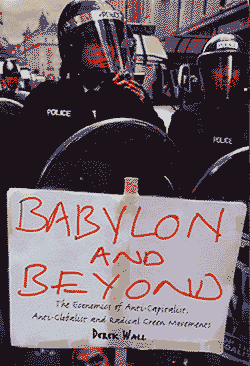 "A thoughtful and inspiring guide to capitalism and anti-capitalism. This really is the
first book that carefully explains the different varieties of anti-capitalist thought ...
I thoroughly recommend that you read Babylon and Beyond."
"A thoughtful and inspiring guide to capitalism and anti-capitalism. This really is the
first book that carefully explains the different varieties of anti-capitalist thought ...
I thoroughly recommend that you read Babylon and Beyond."
- Caroline Lucas, MEP
"There are far too many books on anti-capitalism out there already - but with Babylon
and Beyond, Derek Wall has removed the need to read most of them. Just read this one: a
succinct, intelligent and witty summary of what it's all about."
- Paul Kingsnorth, author of One No, Many Yeses: A Journey to the Heart of the Global
Resistance Movement
"A synthesis of Red and Green is the future of progressive politics. Wall illuminates the
interface of ecological and socialist ideas; divining common threads and offering the
hope of a democratic, just and sustainable future for humankind."
- Peter Tatchell, human rights campaigner
Babylon and Beyond provides the first clear and accessible guide to the economics of
anti-capitalism. Anti-capitalism is a diverse movement: critics accuse it of knowing what
it is against, but not knowing what it is for. Anti-capitalists want radical change, but
what shape should that change take?
The truth is that different sections of the movement advocate distinct - sometimes
complementary, sometimes contradictory - programmes for change. This book concentrates on
perhaps the most divisive issue of all in the anti-capitalist struggle: how to transform
the economy.
There are greens who think we must hold back economic growth and Marxists who believe the
economy must move forward along capitalist lines before there can be revolutionary
change; there are those who remain faithful to notions of collective or state ownership
of all aspects of the economy, and those who think various kinds of reform or regulation
of capitalist practice is more appropriate.
Babylon and Beyond is a modern guidebook to the complicated terrain of alternatives to
global capitalism. Derek Wall explains and summarises the rich variety of theories
available within the anti-capitalist movement. Chapters cover
Marxism, Autonomism, Anarchism, Ecosocialism, Capitalist reformers (like George Soros and
Joseph Stiglitz), Green localists (like Colin Hines), and others. Unique in its
coverage, clear and accessible, the book is ideal for activists, and anyone who is trying to
find a useful way forward.
Contents
Foreword: Nandor Tanczos
1 Warm Conspiracies and Cold Concepts
2 Vaccinating against Anti-Capitalism: Stiglitz, Soros and Friends
3 White Collar Global Crime Syndicate: Korten, Klein and other Anti-Corporates
4 Small is Beautiful: Green Localism
5 Planet Earth Money Martyred: Social Credit and Monetary Reform
6 Imperialism Unlimited: Marxisms
7 The Tribe of Moles: Autonomism, Anarchism and Empire
8 Marx on the Seashore: Ecosocialist Alternatives
9 Life After Capitalism: Alternatives, Structures, Strategies
Babylon and Beyond
Richard Scrase interviews green economist, Derek Wall, about his latest book:
What were you trying to achieve by writing Babylon and Beyond?
Scientists say that the great apes will all by extinct by 2051, I'm a great ape, so
pretty much everything I do, from joining the Party 25 years ago to my religious stuff to
my interest in Marx to writing, is motivated by the struggle to get to another green
world where our survival is not under threat. Well I suppose the clich? is to show that
another world is possible! So many of the books I read on anti-capitalism seemed a bit
tame, we really have to realise that even without Bush and Blair we have a whole
civilisation where money runs everything. And as Bob Dylan used to say "money doesn't talk, it swears". We worship the economy, if something makes cash it is seen to be good,
if not forget it. So I really wanted to talk about a different way of doing things.
It also has a more straightforward purpose as a kind of "everything you wanted to know
about anti-capitalism but were afraid to ask". Since the Seattle World Trade talks
thousands have taken to the streets to protest but what do anti-capitalists believe. I
have tried to outline as clearly as possible the different forms of anti-capitalism on
offer. I move through the anti-capitalist capitalists George Soros and Joseph Stiglitz
through to autonomist 'anarchists', social creditors/monetary reformers, ecosocialists
and Caroline Lucas with her green alternatives to globalisation has virtually a whole
chapter. Incidentally the book has a very nice photo of Caroline being carried off by the
police, thanks Caroline!
Your book presents and explains a wide variety of anti-capitalist thought, but says less
about the possibility of taming capital by regulation, the social-democratic road to
sustainability. Why is that?
Well, I think the essence for me of green politics is to say we live in a system that
cannot do without continual economic growth, unfortunately from peak oil to climate
change to the rain-forests and maybe a dozen other ecological issues such growth is
incompatible with the basic physical realities of our planet. So for good or for ill
Green politics is rather more revolutionary than social democracy. The key is to come up
with transitional policies that start to shift the world in the direction of a new
ecological dynamic, not just to manage the chaos. I think that this is something that we
do in the Manifesto for a Sustainable Society and I have talked about in some depth in
earlier books like Getting There - steps to a Green Society.
Regulating supermarkets to take a one example is good, having worker/consumer localised
food markets is a better step, expanding the 'for-free permaculture' that has existed on
this planet for thousands of years better still.
I met a man recently who has just started a car-pool in Yeovil and he was relieved to
share the responsibility and hassle of ownership. I enjoyed your account of various times
and instances when people have voluntarily come together into collectives, but could you
not have found more examples existing today of people sharing things in common?
I think this is a definite weakness of the book, the open source principle which is a
very big deal was something that I only learnt about about three weeks from finishing.
Car pooling is another example. However the principle of prosperity without GNP growth
means that through social sharing we can have access to some very nice things without
having to work so hard, worry over possessions or waste resources, may be even cars.
My next book, (and I am looking for a publisher who can do large picture books and isn't
afraid of a creative commons license (so people can photocopy the whole thing!)) is going
to be Shopping without Money: A reader in very alternative economics which will be an
encyclopaedia of open source, perm culture, commons regimes, and so on.
One of the problems I personally have with alternatives to capitalism is I see little
evidence that these alternatives can deliver the goods. I'm writing this message on a
computer produced by one corporation, my broadband connection is provided by another
corporation (although it has to be said that it relies on a BT infrastructure that was
originally in public ownership). The food in my kitchen was transported into London in
the vehicles made by yet another company and so on. How can these leviathans be brought
under control? Public ownership in the old state-corporatist model?
Open source shows that we don't have to have big government pushing us around or the
unlimited free market. We have to tame the market and as Karl Polanyi argues, to embed it
in local communities, and we need to start expanding the parts of the economy which are
beyond the government and market. I know people who build pcs from bits, I get most of my
vegetables from the farmers market, open source free software such as the Mozilla browser
or open office is much better than microsoft.
And Libraries are great, don't buy my book, order it from the library, these are a state
institution that needs strongly defending and expanding, why not libraries for virtually
everything?
Practically a crusade against Tescos and the other big supermarkets is something the
Green Party should be doing but both Waitrose and the Co-op are utopian institutions
owned respectively by the workers and the consumers! There is so much moving in South
America, Naomi Klein's film The Take is about workers taking over bankrupt factories
including Argentina's largest ceramics firm Zenon. One day they might make your pc.
Your explanation of how banks create money was a delight. The Green Party always seems to
struggle to pay for those bits of the economy we cannot do without. I wonder, and I'm
being serious here, do you think our party should set up an 'open-source' bank/building
society/credit co-op, to make homes and jobs for people without making a profit, and also
help people out of debt-slavery?
Well tricky slippery stuff money - it is essentially created out of nothing, so there is
some scope for the community to create it rather than the banks. According to the
Economist there is already an open source banking service that brings borrowers and
lenders together called ZOPA and Smile has its virtues along with Tridos. But you can't
print too much or you have inflation, equally none of the stuff is clean, we need to do
more without cash.
At times your argument wanders from the world of scientific materialism into the italism
of Rastafarianism and Zen. There is a long tradition of anti-materialism in Christianity
but you seem to prefer italism, why is that? And do you think society requires a
spiritual or religious component to transform itself?
I am devoted to Zen and sit every week in South London. However this is a very
materialistic pursuit not in the greed sense but in the sense of being rooted in the
material world. The poet William Blake who saw angels in Peckham, said that "everything
that lives is holy" but most of us are trying to escape our beautiful world. The idea of
spirit versus matter is an evil to me, religion that preaches that we should escape from
a world of original sin is wrong. Likewise the insane pursuit of ego whether a new car or
even wanting to be Britain's first Green MP can become a prison. So I am not interested
in whether god exists or not and I am a materialist but practical forms of paganism are
essential to me. Italism is great, there are some amazing green strains in Rastafarianism
and other African/Carribbean religions but the black contribution is almost always
written out of history.
And lastly, the what next question. Another book? teaching people using this one?
Well Shopping without money would be fun and I always enjoy teaching, I would like to
do more in the Green Party. I am always afraid that we lose the big picture and get
absorbed in internal argument and wheely bins. However as the German novelist Heinrich
Boll said, "the Greens are our only hope". The Green Party is vital because it makes
people rethink capitalism in a way no other party does, fighting elections and canvassing
gets ideas across. We can't wait until 2046 to get into government, which only gives us
five years to save the apes, we have to change things now and I want to be part of this
change.
Babylon and Beyond, the economics of anti-capatalist, anti-globalist and radical green
movements by Derek Wall. Printed by Pluto Press
And please ask your library to order it!
– Review: Derek Wall



 "A thoughtful and inspiring guide to capitalism and anti-capitalism. This really is the
first book that carefully explains the different varieties of anti-capitalist thought ...
I thoroughly recommend that you read Babylon and Beyond."
"A thoughtful and inspiring guide to capitalism and anti-capitalism. This really is the
first book that carefully explains the different varieties of anti-capitalist thought ...
I thoroughly recommend that you read Babylon and Beyond."

 About the Author
About the Author